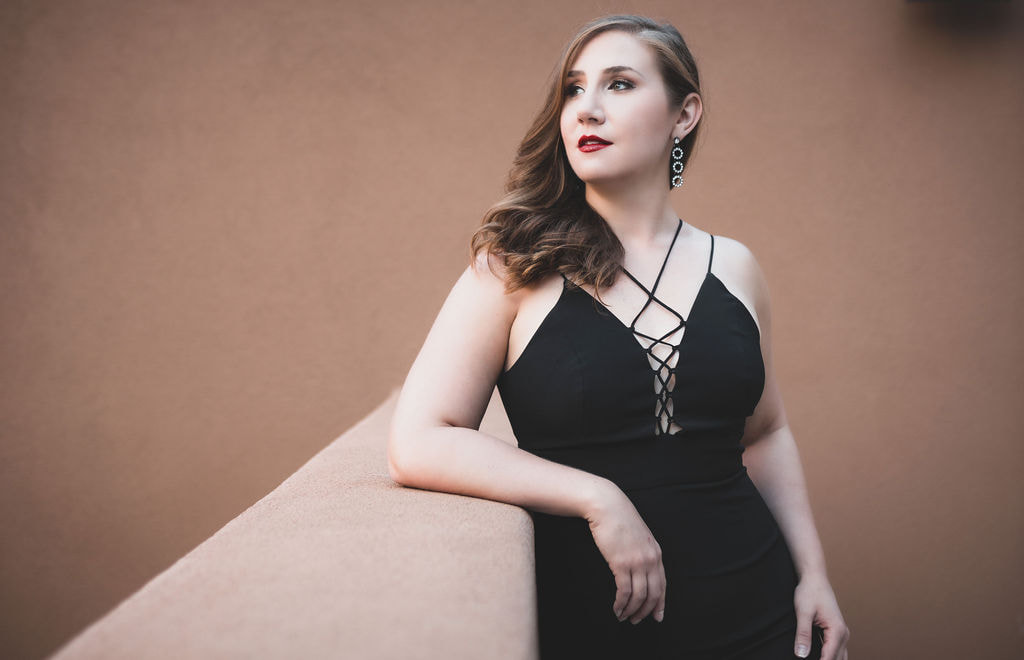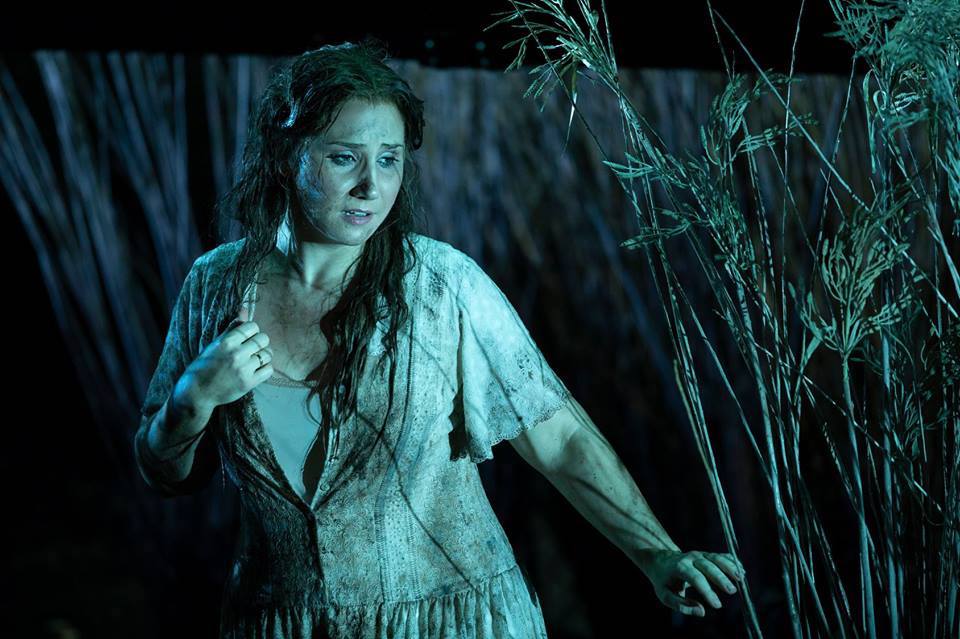American soprano Laura Wilde’s first love was the trumpet. Growing up in South Dakota, opera was in scarce supply and her heart was set on becoming a professional trumpet player. It wasn’t until she attended Michigan’s Interlochen Arts Camp in her teens that she began to develop an interest in singing thanks to voice lessons she’d decided to take up on a whim. Wilde eventually ended up at college in Minnesota, where she had been accepted for a degree in both trumpet and voice. But it wasn’t long until she recognised that opera might just be the thing.
 Laura Wilde. Photo © Gillian Riesen
Laura Wilde. Photo © Gillian Riesen
“In the practice room I would be there for hours switching between trumpet and singing, and I eventually realised that I was wanting to sing a lot more than I was playing. But I still wasn’t sure – it’s a bizarre career and you don’t really know what it involves as a student. But I got to do some performances and really enjoyed it, whereas with trumpet I used to shake with nerves. Singing, I didn’t get nervous.”
Wilde ended up switching her major to vocal performance halfway through her degree, and when it came to apply for graduate schools, she pursued full performance for her masters. But it wasn’t all smooth sailing – she began her vocal training as a mezzo, but soon enough fellow chorus members and coaches mentioned that she might actually be a soprano. The switch to the soprano fach required a significant rejig of technique.
“To be totally honest, we had to sort of recalibrate everything. How I approached the middle voice, and the low. Mezzos have one big high note at the end of the piece, sopranos have a whole bunch of high notes and then a higher note, so I had to learn how to pace and how to not scream up there or throw it. I needed to figure out different ways of singing high notes, it couldn’t just be loud.”
“I had about two years where it was really tough because I felt like I couldn’t act or let go onstage because I had to be so focused on making sure I was using the voice correctly,” Wilde adds. “But for me the German, Slavic and Czech repertoire started to unlock what type of soprano I would become. I was luckily at an opera company that didn’t just do the Italian and French rep, but Strauss and Dvořák as well. Once I started singing Strauss, the real German repertoire, that helped me to point my soprano technique in a direction.”
 Photo © Gillian Riesen
Photo © Gillian Riesen
That company was the Lyric Opera of Chicago, where Wilde was a member of its prestigious young artist development program, the Ryan Opera Center. Describing it as a “real linchpin” in her career, the soprano says that she benefitted immeasurably from the opportunity to appear onstage in small roles as well as cover stars in rehearsal. One of the highlights of Wilde’s time there was the opportunity to stage the entirety of Capriccio in place of Renée Fleming, which gave her the opportunity to work alongside mezzo Anne Sofie von Otter, one of her favourite singers.
“You get all the experience you need at this incredibly high level working with these superstars,” she says. “The biggest thing for me about the Ryan Center is that its administration really wants each singer to succeed and does everything they can to make that happen. There were times during my vocal transition that I really struggled to find my footing and I had doubts whether or not it was the right choice, and they all believed in me when I didn’t. They had the history and know-how to know where my voice was going when I couldn’t see.”
The Ryan Center also introduced her to Sir Andrew Davis, who in addition to being the outgoing Chief Conductor of Melbourne Symphony Orchestra is also the Lyric Opera’s Music Director. Wilde is to be reunited with Davis soon for the MSO’s upcoming Hansel and Gretel in Concert, where she will be reprising the role of Gretel. It was under his direction that she made her role debut at the 2018 Edinburgh Festival, again in concert.
Explaining why she hasn’t yet done a full production of the opera, Wilde laughs and says that her height (five foot nine) means she’s not getting offers to play little girls very often. More seriously, it’s also a matter of vocal weight. Gretel is often taken by light lyric and coloratura sopranos, whereas Wilde’s fuller lyric instrument has seen her take on heavier roles like Katya Kábanová, Jenůfa and Donna Anna.
“As someone pointed out recently, I’m doing Sieglinde and Gretel in the same season which is pretty unheard of. There are sections of the opera that aren’t super idiomatic to my voice, like the patter and the high and light passages. But a lot of those are on top of big orchestra moments – it’s a pretty big, almost Wagnerian sized orchestra – and those are moments that come much easier to me than the sopranos who are usually cast. I get to really let go in those moments. The biggest challenge for me specifically is figuring out how to bring lightness into it but still have my whole voice for these big moments.”
 Laura Wilde as Katya Kábanová for Scottish Opera in 2019. Photo © James Glossop
Laura Wilde as Katya Kábanová for Scottish Opera in 2019. Photo © James Glossop
Performing Hansel and Gretel in concert means that Davis is able to handpick his cast, meaning discrepancies in vocal amplitude among the singers can be managed. Wilde’s Hansel will again be mezzo Elizabeth DeShong, who she performed opposite in Edinburgh. “Like I said, I’m not a typical casting choice for Gretel but Sir Andrew has these ears and he knows what he wants and how to balance the orchestra with the singers.”
Describing the character of Gretel as “very similar to adult me”, it’s clear that Wilde has a sincere fondness for the role, of which she can speak of with insight. “I think she’s a rule follower, someone who had to grow up quicker than she would have liked because of her family’s situation and her being the older sister. The cool thing about it is you sort of see her trying to be the adult multiple times, but she can’t stop being a child. At the beginning of the opera, she’s adamant that she and Hansel have to get their work done, but she eventually gives into his dancing. It’s the same when they find the witch’s house, where she’s initially the voice of reason but then gives in and enters it. You see the adult she’s going to become but for the moment she’s still a little girl.”
Wilde wasn’t especially familiar with Humperdinck’s opera before she was offered the role of Gretel, but when she began studying it was struck by the beauty and immediacy of the score.
“I think it’s some of the most beautiful music ever written. It’s lush and there’s character in it and it’s funny. Humperdinck did such a great job of putting the drama of the moment into the orchestration. You can tell what’s going on just by listening to the orchestra and I think the story, everyone’s going to love, especially first-time opera goers. I can see why it’s really considered one of the greats – it does everything opera is supposed to do, it’s great theatre combined with glorious music.”
The prospect of returning to the opera is made even more thrilling by the opportunity to work with Davis again. “He has this incredible joy that he brings especially to pieces that he love. It’s really inspiring to see that from him because you don’t always get that from the pit. He knows these pieces so well that he can get lost in it with us but there’s always that incredible technique that brings everything together.”
“It’s been especially rewarding that a lot of my big next moments after graduating from the Ryan Center have been with him,” Wilde reflects. “The Ring at the Lyric, doing my first Freia and Ortlinde. I’ll also do my first Sieglinde with him this year, and my first time in Australia with him is really special.”
Melbourne Symphony Orchestra’s Hansel and Gretel is at Hamer Hall, November 28 and 30











Comments
Log in to join the conversation.